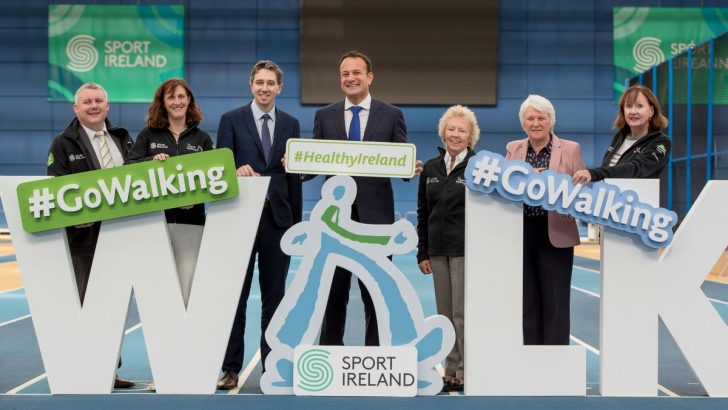Walking is the easiest way to get active and healthy, both physically and mentally. Most health professionals prefer walking over running as it is a low-impact exercise that goes easy on your heart and joints. It’s inexpensive and can be done anywhere, at any age or fitness level, alone or in a group, and you can set the pace and length of walk to suit yourself. Walking can also be a gateway physical activity that can lead on to participation in other sports including hillwalking. All you need to do is make time for a walk in your daily life.
To reap the health benefits you should aim to walk for at least 20-30 minutes each day. Even with something as enjoyable and easy as walking, it can be hard to stick with a regular exercise regime when life gets busy. If it is a struggle to find the time to go for walks you could incorporate more walking into your daily routine, for example collect the children from school on foot instead of in the car, walk to the shops if you are only doing a quick shop, or get off your bus a stop earlier to walk home.
Walking is currently the most popular form of physical activity in Ireland. The 2015 Irish Sports Monitor, which surveyed over 8,500 respondents, found that 64.8% took part in recreational walking, nearly five times as many participants as personal exercise, which was the most popular sporting activity.
On average, walkers take 4.5 walks per week. Regardless of the frequency of walks, the average walking duration is 45 minutes with 80% of walks lasting for at least 30 minutes.
The National Physical Activity guidelines recommend 150 minutes per week of moderate or vigorous physical activity i.e. five 30-minute sessions. However, any amount of physical activity can provide benefits. Recreational walking is the ideal activity for participants new to physical activity or those who are already active but may not be meeting the guidelines.
Socially Active
Findings from The Irish Longitudinal Study on Ageing (TILDA) demonstrated that those aged 50 years and older who walk for the recommended 150 minutes per week had better wellbeing and were more socially active.
Like all new activities, the key to getting the most from walking is to make it a habit. Once you’ve been walking confidently for a while, extend your walks – in length and challenge – so you keep up the benefits. Get friends and family to join you to make it more enjoyable and to encourage you to keep going. You could find a walking group near you to get help and support on how you can turn a first-step to fitness into a sporting activity.
“The health benefits of walking, both physical and mental, cannot be underestimated,” according to John Treacy, CEO of Sport Ireland. He was speaking at the launch of the first Strategy and Action Plan for Get Ireland Walking (GIW). This initiative, established in 2013, aims to encourage widespread participation in walking, promote the benefits of walking, and unify the efforts of all organisations and agencies interested in promoting walking for recreation, transport and health.
We can expect to see a new focus on walking nationwide with the implementation of Get Ireland Walking’s Strategy and Action Plan 2017-2021, which was developed in consultation with government agencies, sporting bodies, charities, not for profit organisations and other stakeholders. The actions within the document are arranged into thematic areas that reflect action areas of Ireland’s National Physical Activity Plan and include: Public Awareness, Education and Communication; Children and Young People; Health; Environment; Communities; Research, Monitoring and Evaluation; Partnerships. These themes complement each other to provide a multifaceted approach to increasing recreational walking in Ireland.
Speaking at the launch of the plan, An Taoiseach Leo Varadkar said creating a healthier Ireland is a priority for his Government. “With these new investments we can help more people, more families and more communities to look after their own health and wellbeing. We are supporting three core areas of physical activity, preventing obesity, and creating a tobacco-free society. By working with schools, communities and State bodies, we are joining the dots to ensure that the benefits of Healthy Ireland are felt at local level,” he said.
Minister for Health, Simon Harris TD said GIW’s Strategy and Action Plan offers a clear vision in promoting walking across Ireland. “In addition to this the 41 actions within the plan also reflect areas of Ireland’s National Physical Activity Plan. Together Get Ireland Walking and its partner organisations will work to empower communities and individuals to lead a healthier lifestyle. This form of inter-organisation partnership is vital for success and we look forward to working with our partners in the future,” he said.
Ability
GIW promotes recreational walking to all members of society regardless of age, location or ability. Since it was established it has expanded the number and scope of the programmes offered, with a particular emphasis on disadvantaged communities and low active groups. This is consistent with one of Sport Ireland’s key objectives of providing sporting and physical activity opportunities to people of all ages and backgrounds in Ireland. It links with Healthy Ireland’s goal to reduce health inequalities and Mountaineering Ireland’s values relating to recreation and wellbeing.
There is a list of walking groups available on the GIW website, www.getirelandwalking.ie/findgroup/ as well as lots of tips and advice on how to start walking regularly. GIW has a 21 day challenge, which if completed should make walking a lifestyle habit. The idea is to build up to walking at least 30 minutes a day, while keeping a record of your progress. By tracking how long or how far you walked, you’ll see proof of your improvements, which is a great motivation to keep going. To request a printed copy of the 21 Day Walking Challenge email info@getwalkingireland.ie
When getting started on your new walking routine, make sure you have a comfortable pair of shoes or runners and wear layers of light, breathable clothing that you can take off as you get warmer. Obviously in cold weather you will need extra layers, such as a hat, scarf and gloves. Reflective clothing or a high visibility vest is a good idea on the dark winter mornings and evenings. It’s a good idea to carry a mobile phone, to track your progress, take photographs and in case you run into any difficulty. A bottle of water to take sips from is also good, and maybe a small backpack to carry bulky items.
Doing a short warm-up at the start will limber up your body before a walk and a quick cool-down at the end is also an option.
It can be fun to find new walking routes where you discover places you never knew existed. There are a number of websites which list walking trails such as the Irish Heart Foundation’s Sli na Slainte routes on www.irishheart.ie There are family and buggy-friendly routes on www.irishtrails.ie and forest walks are listed on www.coillteoutdoors.ie
Did you know?
*Walking – at any pace – is beneficial. When you start to walk, pick a speed you can manage, but make sure your heartbeat is slightly raised, you’re breathing a little faster, and you feel a bit warmer.
*For maximum health benefits, adults need to be moderately active for at least 30 minutes a day, five days a week.
*Children and young people need to be moderately or vigorously active for at least 60 minutes a day – every day.
*When you walk at a moderate pace, you will cover 1km in around 12 or 13 minutes. Walking at a brisk pace, you’ll do 1km in just 10 minutes.


 Mags Gargan
Mags Gargan An Taoiseach, Leo Varadkar and Minister for Health, Simon Harris with members of Sport Ireland at the launch of Get Ireland Walking’s Strategy and Action Plan 2017-2020
An Taoiseach, Leo Varadkar and Minister for Health, Simon Harris with members of Sport Ireland at the launch of Get Ireland Walking’s Strategy and Action Plan 2017-2020 